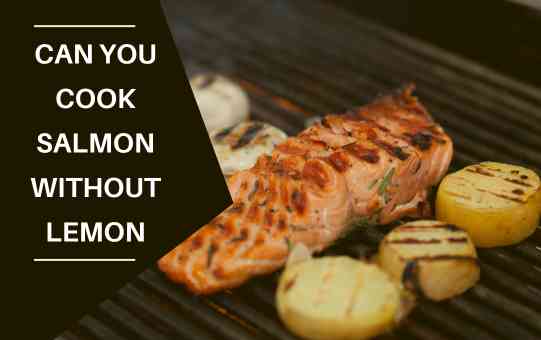Salmon is a delicious and nutritious fish that can be prepared in various ways. Can you cook salmon without lemon one popular ingredient often used when cooking salmon is lemon.
Can you cook salmon without lemon? You can cook salmon without lemon. There are alternative ingredients like herbs, spices, citrus fruits, and vinegar that can provide similar flavors and enhance the taste of the fish.
The tangy flavor of lemon complements the richness of the fish and adds a refreshing touch to the overall dish. To know further about cooking salmon without lemon keep reading the following article.
Contents
The Role of Lemon in Cooking Salmon
Before we talk about ways to cook salmon without lemon, let’s talk about what lemon does. Lemon juice is known for its acidity and bright flavor, which can help cut through the richness of the fish and add a cooling zing.
It also makes the fish more soft and can keep it from drying out as it cooks. But lemon isn’t the only thing that can make these things happen. There are many other things that can be used to cook and add taste in the same way.
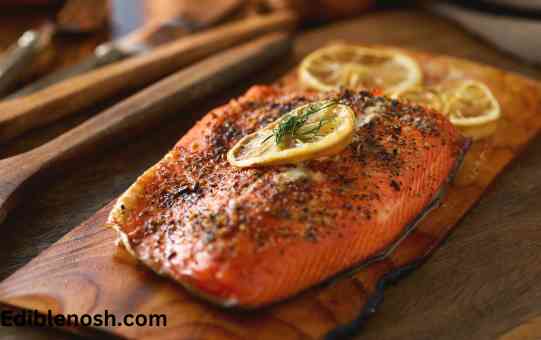
can you cook salmon without lemon?
You can cook salmon with or without lemon. Lemon is a popular ingredient that gives salmon a tangy and citrusy taste, but there are other ways to do it. You can make it taste better by adding herbs and spices like dill, parsley, or pepper.
Other citrus fruits like oranges, limes, and grapefruits can also add a sour kick. Apple cider vinegar or white wine vinegar can give a dish more flavor and depth.
Without using lemon, you can make tasty salmon meals by experimenting with different ingredients and cooking methods.
Cooking Salmon without Lemon: Exploring Flavor Alternatives
When cooking salmon without lemon, you can experiment with alternative flavors to enhance the taste of the fish. Here are some options to consider:
1. Citrus Fruits: Orange and Grapefruit
Lemon is a popular choice, but you can also use other citrus fruits to give your salmon a tangy and fresh taste. Oranges and grapefruits, for example, have a similar acidic punch without drowning the fish. The sweetness of these fruits can give your salmon dish a nice twist.
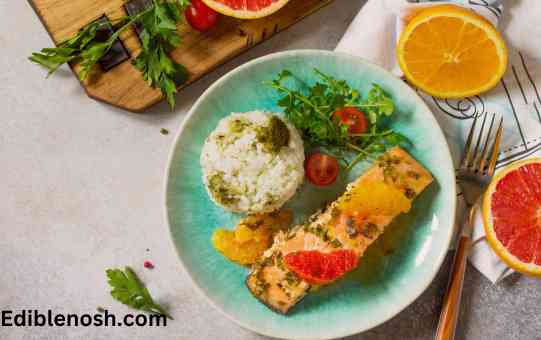
2. Fresh Herbs: Dill and Tarragon
Instead of using citrus fruits, fresh greens are a great way to add flavor to your salmon. Dill and tarragon go well with salmon because their aromatic flavors match the natural richness of the fish.
To improve the taste of the salmon, just chop the herbs and put them on it before or after cooking.
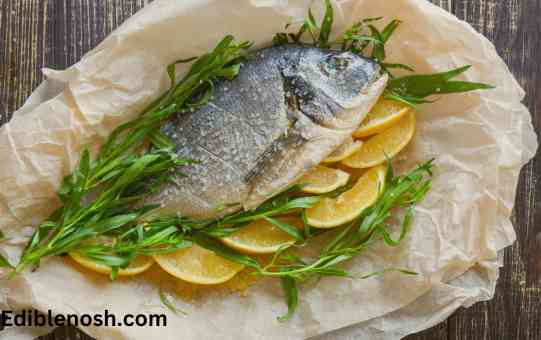
3. Spice Blends: Cajun and Mediterranean
Cajun spice blends and Mediterranean spice blends can give your salmon a whole new taste. With its mix of paprika, cayenne pepper, and other spices, the Cajun flavor gives the fish a wonderful kick. Oregano, thyme, and rosemary are spices from the Mediterranean. They have a strong, earthy flavor that goes well with salmon.
4. Asian Influence: Soy Sauce and Ginger
Soy sauce and ginger can be used to make a salmon dish that is both tasty and smells good if you like Asian tastes. When you mix the umami flavors of soy sauce with the sharpness of ginger, you get a delicious blend of flavors that can be used as a marinade or brushed on the fish as it cooks.
Lemon-Free Salmon Recipes
Now that we have explored alternative ingredients, let’s dive into some lemon-free salmon recipes that will leave your taste buds satisfied.
Garlic Butter Salmon
One delicious option is to prepare garlic butter salmon. Start by seasoning your salmon fillets with salt, pepper, and your choice of herbs such as dill or parsley.
In a pan, melt butter and add minced garlic. Sear the salmon fillets in the garlic butter until cooked to your desired doneness. The buttery and garlicky flavors will infuse the salmon, resulting in a mouthwatering dish.
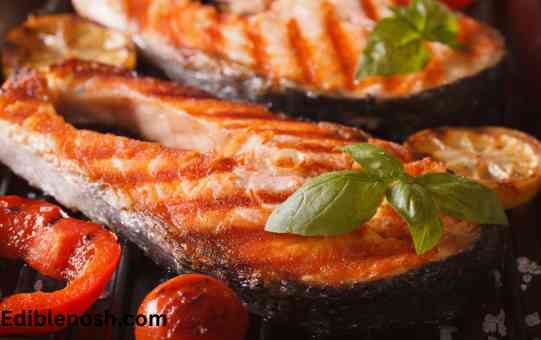
Teriyaki Glazed Salmon
For an Asian-inspired twist, try making teriyaki glazed salmon. Prepare a teriyaki sauce by combining soy sauce, brown sugar, ginger, and garlic in a saucepan. Cook the sauce until it thickens.
Brush the sauce onto the salmon fillets and bake or grill them until perfectly glazed and cooked through. The savory and slightly sweet teriyaki flavors will beautifully complement the salmon.
Dijon Mustard Salmon
If you’re a fan of tangy and slightly spicy flavors, consider making Dijon mustard salmon. Mix Dijon mustard, honey, minced garlic, and a touch of olive oil to create a marinade. Coat the salmon fillets with the marinade and let them sit for at least 30 minutes.
Then, bake or pan-sear the salmon until it reaches your desired level of doneness. The combination of Dijon mustard and honey creates a tantalizing flavor that pairs wonderfully with salmon.
Read Also:
Tips for Cooking Salmon Without Lemon
Cooking salmon without lemon requires a few adjustments to ensure you achieve a flavorful and succulent dish. Here are some tips to help you along the way:
Marinating
Marinating your salmon before cooking can infuse it with flavors and moisture. Consider using alternative ingredients like herbs, spices, citrus fruits, or vinegar in your marinades. Allow the salmon to marinate for at least 30 minutes or up to overnight in the refrigerator for maximum flavor absorption.
Using Flavorful Cooking Techniques
In addition to marinating, experiment with different cooking techniques to bring out the best flavors in your salmon. Grilling, broiling, or pan-searing can create a caramelized crust on the fish while keeping the interior tender and juicy. You can also try poaching or baking salmon in parchment paper for a moist and flavorful result.
Conclusion
Salmon can be cooked with or without lemon, and there are many ways to add flavor to this flexible fish. Whether you choose citrus fruits, fresh herbs, spice blends, or products from Asia, the key is to try different things and find the flavors you like.
Don’t be afraid to try new ingredients and cooking methods to make mouthwatering salmon meals that don’t use lemon but are still very tasty. So, the next time you don’t have lemons, don’t worry—you can still cook salmon perfectly.
Read Also:
Can you add lemon to vanilla cake?
FAQs about Cooking Salmon without Lemon
Here are a few FAQs related to Cooking Salmon without Lemon:
Can I substitute lime for lemon when cooking salmon?
Yes, lime can be a suitable substitute for lemon when cooking salmon. Lime shares similar acidic properties with lemon, and its tangy flavor complements the fish well. You can use lime juice, zest, or slices as a replacement in your recipes.
What can I use instead of citrus fruits when cooking salmon?
If you don’t have any citrus fruits available, you can explore other options to add flavor to your salmon. Consider using white wine, apple cider vinegar, or even white vinegar as a substitute for the acidic element.
Are there non-acidic alternatives to enhance the taste of salmon?
Absolutely! While acid adds a unique tanginess, you can enhance the flavor of salmon without relying on acidity. Consider using spices like smoked paprika, cumin, or even a touch of honey or maple syrup to create a delightful balance of sweet and savory notes.
Can I cook salmon without any additional flavorings?
Yes, you can simply season the salmon with salt, pepper, and a drizzle of olive oil for a simple and elegant preparation. The natural flavor of salmon is delicious on its own, and minimal seasoning can allow it to shine.
What cooking methods are best for salmon without lemon?
Salmon can be cooked using various methods without lemon. Grilling, baking, pan-searing, or even poaching are all great options. Each method provides a unique texture and taste, so feel free to experiment and find the cooking technique that suits your preferences.

